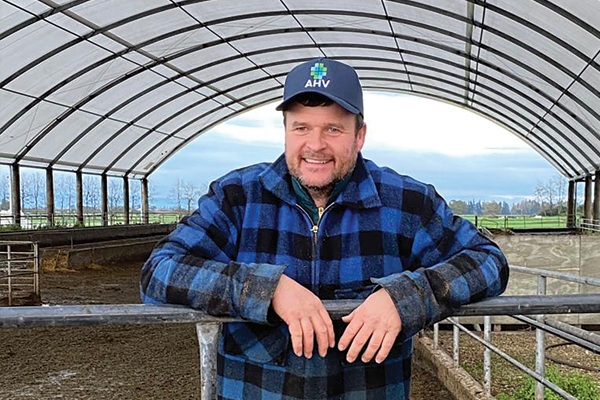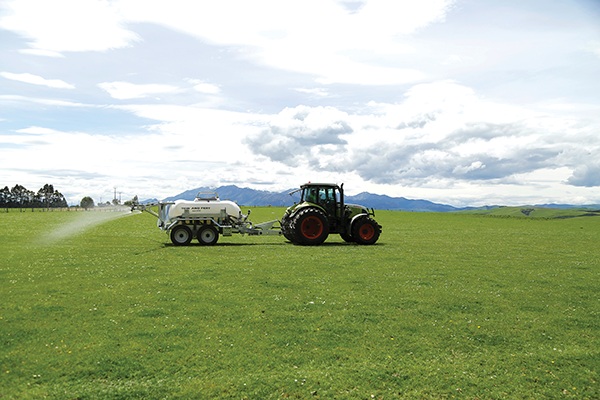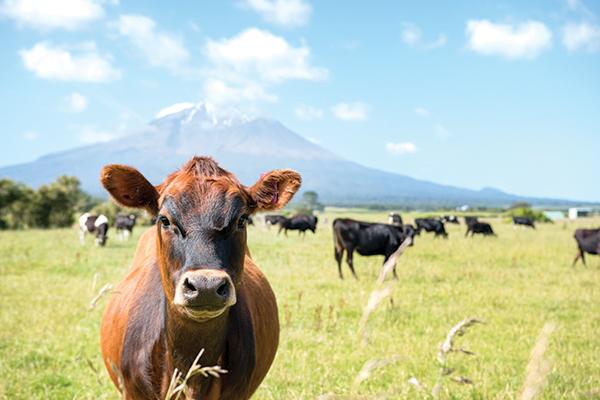A robot that sweeps, wheels around, lifts its skirts, sends and receives bluetooth directions and recharges its own batteries sounds like an R2D2 housekeeping invention, but is actually the latest iteration of the Lely Juno feed sweeper.
As fast as the cows housed in a barn push the feed away while reaching for and eating it from the feed lane, the Juno self-propels itself around the walls sweeping it back within reach of the feeding milk-makers. The technology has been shown to result in 75% less wasted feed, potentially leading to a 2.8% increase in feed intake within the herd, which encourages the cows to visit the robotic milker more often.
Automatic feed pushing 24 hours a day significantly reduces labour requirements and feed costs while reducing cow aggression and stress by ensuring feed is always within reach.
The unit is fitted with dynamic feed pushing software with the ability to set the frequency depending on feed type and set a minimum distance from the wall.
Designed by Lely to complement the robotic milker and Vector auto-feeding system, the new Juno follows walls and fences on both sides and travels along metal guiding strips to the charging station, or to escape the barn and travel to another adjoining barn.
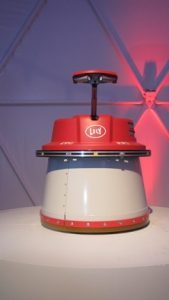
The new capability of lifting its skirts both on the left and the right-hand side means it can travel over small obstacles and keep clean while travelling across soiled cow lanes between feed lanes, cutting down the incidence of feed contamination.
It is also able to travel up an incline of up to 15 degrees and the supplied App allows the farmer to create and set routes for it to use around the barn and between facilities, driven by a finger moving around a cell phone screen.
The Bluetooth capability allows the Juno to open doors and push feed in multiple barns.
The Juno has been in production for 10 years, with 8000 sold and the third-generation machine is the most advanced, ensuring there is always clean food for each cow, with a positive effect on animal health, fertility and milk production.
The unit is fitted with dynamic feed pushing software with the ability to set the frequency depending on feed type and set a minimum distance from the wall. An electric pulse keeps the cows away from rubbing or bunting it and stopping the unit. A bumper system and collision detector prevents damage and ensures the unit stops when it encounters an obstacle and a nightlight allows it to push feed at all hours.
Latest Lely Astronaut A5 revealed
Lely have sold 30,000 robotic milking units over the past 20 years, and a focus on continuous improvement has resulted in the launch of the A5 version.
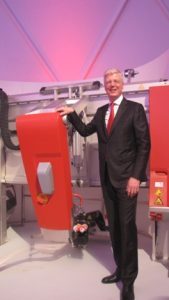
With the A5, cow comfort has been further improved with a new hybrid arm: silent, faster, more energy-efficient and more accurate, resulting in consistent milking and 30% faster attachment. Instantly following the cow’s every movement during milking and remaining close to the udder, it quickly corrects itself in the case of any unexpected movement, ensuring a fast and thorough milking process, even with heifers.
The new Teat Detection System (TDS) improves post-milking teat spraying by pre-scanning the udder before spraying, ensuring optimal udder hygiene and limiting the risk of contamination.
The redesigned, intuitive user interface makes automatic milking easy to understand for everybody. From a cow’s first milking to everyday maintenance, all relevant information is available on one single page. Instant actions, such as feed allocation, cow-specific routing and daily maintenance tasks are just one click away.
To achieve a significantly lower total cost per kg of milk produced, Lely has redesigned the complete system. An extensive worldwide validation programme, with more than 30 customers and more than 2 million milkings across a wide temperature range showed lower detergent and water consumption and 20% less energy requirement. Investments in quick and easy maintenance and the use of high-quality components also resulted in significant reduction of maintenance costs.
Along with improved efficiency, this highly reliable, maintenance-friendly design has achieved an unrivalled return on investment. The first A5 units will arrive in New Zealand in mid-late May 2018.
Future Farming vision for Lely
Celebrating 70 years of innovation in 2018, Dutch family company Lely unveiled its vision for the future of farming within the dairy sector. Following the sale of its forage division in 2016, the Maasluis-headquartered but globally focused company has concentrated on dairy automation and spends 6% of its turnover on research and development.
At the April Lely Future Farm Days, chief executive Alexander van der Lely presented the company vision of a sustainable, fully robotic dairy farm, designed around the cow and committed to the principle of management by exception.
Only the cows flagged by the robotic milker as needing attention are drafted out for treatment and handled – the rest are left in a stress-free environment to go about their business, eating, milking and sleeping.
‘The highest production days for cows in intensive European barn farms are Sundays – when there is skeleton staff on and the cows are largely left alone,” media were told on a farm visit in eastern Germany.
Van der Lely strongly believes in a bright future in dairy farming, envisaging fully robotic dairy farms worldwide.
“In our vision, the full robotic farm runs fulltime, 24 hours a day. Whether it is about feeding, milking, cleaning or animal care, automation takes away repetitive work for the farmer, enabling him to focus on those individual cows that really need his attention.
“It has been proven that this leads to a large number of benefits for both cow and farmer, such as higher milk yields, healthier and happier cows, and a better work-life-balance for the farmer. This has been the purpose from the day we started our company, 70 years ago.”
Future focus
Focusing on the wellbeing of the cow, the farmer, the consumer and the environment, van der Lely highlighted a few of the innovations the company is working on.
Recycling manure: Lely revealed it is testing innovations related to the impact of manure on the farm. A new development will enable recycling of the nutrients within the collected manure, substituting them for synthetic fertiliser, reducing cost and environmental impact, increasing sustainability and giving the farmer a licence to operate.
Decision-based farm management software: The company is close to launching software using the many data sources available onfarm and from the ecosystem surrounding it. Instead of only presenting information, the system will propose or even make decisions with the farmer’s permission. The system will be self-learning and, over time, will adapt to the farmer’s preferences for running the farm.
Farm milk processing: Farm scale processing of milk into local, traceable and differentiated products for the local market is also a vision of the company, who believe consumer demand for locally sourced and trusted products will continue to grow.
One of the many advantages of robotic milking is the fact that farmers can separate specific milks as they wish, with help of a processing unit.
Lely has built and is testing a unit which can trace the milk back to the cow that produced it, with its own unique taste and freshness. As a first important step, the company is speaking to large Dutch retailers to realise the availability of this locally produced, farm-processed, tailor-made milk in shops.
Virtual reality training and service: Service technicians in the future will be trained and guided through service and maintenance tasks with the help of augmented reality headsets, making the process faster and less paper-based. Service over the internet is another area the company is investigating, saying it would like to move to the method once it is a viable option for software.
Lease and rental schemes: Lely also revealed a pilot scheme renting robotic milking machines to French farmers for a per-litre payment, overcoming the high capital cost at installation. While the robotic market in France, Netherlands and Denmark is becoming mature, the company sees lots of potential in many other countries, where herd sizes are small and are anticipating quicker growth in robot uptake than has been seen in the past 25 years.


